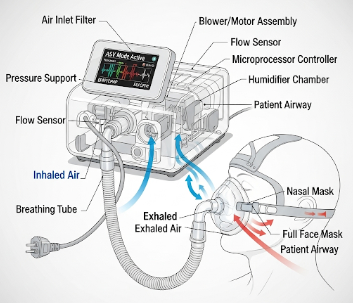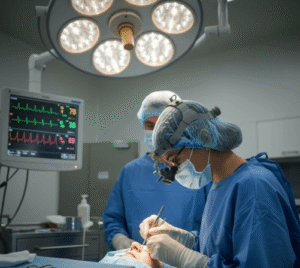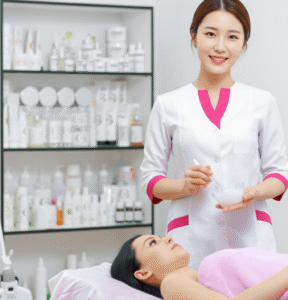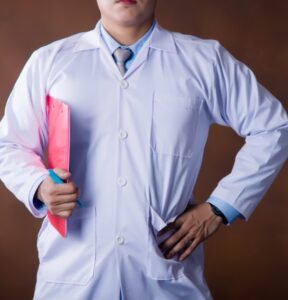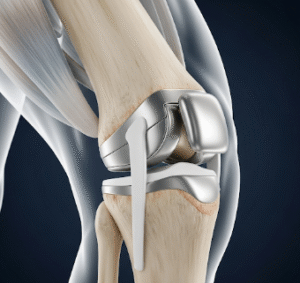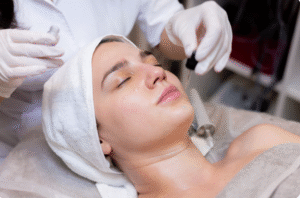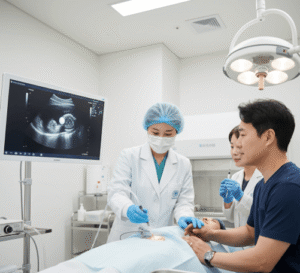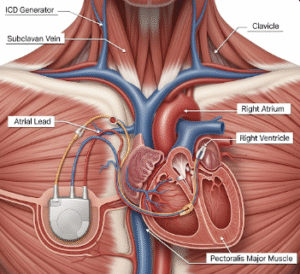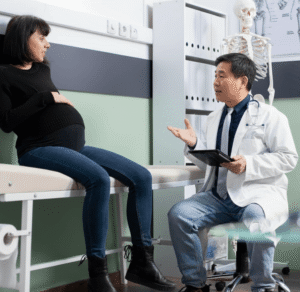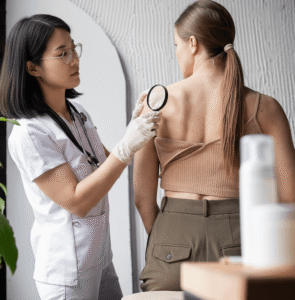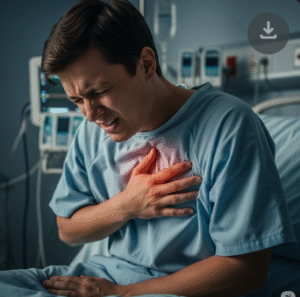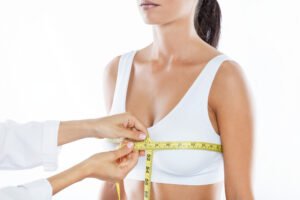Overview
An ASV machine (Adaptive Servo-Ventilation) is a medical device used to treat central sleep apnea (CSA) and complex sleep-disordered breathing, particularly in patients with heart failure or Cheyne-Stokes respiration. Unlike traditional CPAP machines, ASV adapts the airflow dynamically to stabilize breathing patterns, ensuring regular oxygen levels and normal respiratory rhythms during sleep.
In Korea, ASV machines are prescribed by sleep medicine specialists and used in conjunction with comprehensive sleep studies at advanced sleep clinics and hospitals. Patients benefit from personalized therapy, expert monitoring, and follow-up adjustments to optimize outcomes and improve sleep quality and cardiovascular health.
What is an ASV Machine?
ASV is a non-invasive ventilatory support device that:
- Continuously monitors a patient’s breathing patterns during sleep
- Automatically adjusts air pressure delivery to normalize respiration
- Prevents apnea (complete pause in breathing) and hypopnea (shallow breathing) episodes
- Designed specifically for central sleep apnea, complex sleep apnea, and Cheyne-Stokes respiration
Key points:
- Provides dynamic inspiratory pressure support based on real-time breathing
- Reduces symptoms of sleep fragmentation, fatigue, and daytime sleepiness
- Supports heart failure patients who often have complex breathing patterns
- Can be used at home under medical guidance, with data monitoring for adjustments
What are the benefits?
- Improves oxygenation and ventilation during sleep
- Reduces sleep apnea episodes, enhancing overall sleep quality
- Alleviates daytime fatigue, cognitive issues, and mood disturbances
- ✅ Protects heart failure patients by stabilizing Cheyne-Stokes respiration
- ✅ Customizable therapy with automated pressure adjustments for comfort and effectiveness
- ✅ Can be combined with other sleep therapies or cardiovascular management
- ✅ Modern ASV machines in Korea offer remote monitoring and data logging for clinicians
Procedure Details
1) How should I prepare for ASV Machine use?
- ➤ Undergo a comprehensive sleep study (polysomnography) to diagnose sleep apnea type
- ➤ Medical evaluation including cardiovascular and respiratory assessment
- ➤ Discuss medications affecting breathing or sleep with your physician
- ➤ Learn mask fitting, device operation, and maintenance from trained sleep technicians
- ➤ Arrange follow-up appointments for monitoring therapy effectiveness
2) What happens during ASV Machine therapy?
- ✅ A mask or nasal interface is fitted to the patient’s nose or face
- ✅ The machine monitors breathing patterns continuously throughout sleep
- ✅ Adaptive pressure is delivered to prevent apnea or hypopnea events
- ✅ Therapy data is recorded and transmitted to the physician for adjustment
- ✅ Patients usually use the machine every night, often for several hours during sleep
3) What happens after ASV Machine therapy?
- ➤ Sleep quality improves over days to weeks, depending on compliance
- ➤ Patients may experience reduced daytime fatigue and better cognitive function
- ➤ Regular follow-up sleep studies or device data reviews ensure optimal therapy
- ➤ Mask fitting and pressure settings may be adjusted for comfort and effectiveness
- ➤ Long-term use supports heart health, breathing stability, and overall quality of life
Risks / Benefits
Potential Risks:
- ➤ Mask discomfort or skin irritation
- ➤ Dry mouth or nasal congestion
- ➤ Aerophagia (swallowing air causing bloating)
- ➤ Rare lung complications in severe cases
- ➤ Possible difficulty adjusting to machine initially
Benefits:
- ✅ Effectively treats central and complex sleep apnea
- ✅ Reduces sleep fragmentation and daytime fatigue
- ✅ Supports cardiovascular health in high-risk patients
- ✅ Adjustable and personalized therapy for comfort
- ✅ Non-invasive and can be used safely at home with monitoring
- ✅ In Korea, specialized sleep clinics ensure expert guidance and follow-up
Recovery and Outlook
- Adjustment period: Most patients adapt within 1–2 weeks
- Activity: No restrictions; therapy is used during sleep only
- Follow-up: Regular check-ins for mask fit, pressure settings, and therapy compliance
- Long-term outcomes: Improved sleep quality, reduced cardiovascular risk, and enhanced daytime functioning
- Lifestyle: Encouraged to maintain healthy sleep hygiene, avoid alcohol before sleep, and follow physician recommendations
When To Call the Doctor
- ➤ Persistent difficulty breathing while using the device
- ➤ Severe mask discomfort or skin irritation
- ➤ Increased daytime sleepiness or fatigue
- ➤ Device malfunction or alarms
- ➤ Unusual symptoms such as dizziness, palpitations, or chest discomfort
Best Korea Option / Process
- ✅ Korea offers specialized sleep medicine centers with ASV therapy expertise
- ✅ Comprehensive services include diagnosis, device prescription, mask fitting, and follow-up monitoring
- ✅ Experienced sleep specialists provide customized therapy plans and adjustments
- ✅ Advanced machines allow remote monitoring, data logging, and telemedicine follow-up
- ✅ International patients benefit from VIP coordination, English-speaking staff, and post-therapy support
- ✅ High-quality care ensures effective treatment, patient comfort, and long-term compliance

